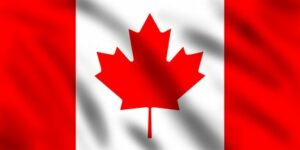AbroadBro Score: 7/10
The Good: Canada is known for its natural beauty, diverse culture, and friendly people. The country is also known for its high standard of living and a strong economy. The education system in Canada is considered to be among the best in the world, with many universities and colleges offering high-quality programs and degrees. Additionally, Canada is known for its welcoming attitude toward international students and its commitment to diversity and inclusivity.
The Bad: While Canada is a great place to study, there are some downsides to consider. The cost of living in Canada can be high, particularly in larger cities such as Toronto and Vancouver. Additionally, the country can be quite cold in the winter, which can be challenging for some students to adjust to. Additionally, there can be a lack of affordable housing available in some areas, which can make it difficult for students to find a place to live.
The Ugly: Very, Very Cold!!! High Tuition fees, high Crime rate.
Education Quality: The education system in Canada is considered to be among the best in the world. The country is home to many prestigious universities and colleges, which offer a wide range of programs and degrees. Additionally, many universities and colleges in Canada have strong research and innovation programs, which provide many opportunities for students to conduct cutting-edge research.
Tuition Fees: The cost of tuition in Canada can vary depending on the institution and the program. However, in general, the cost of tuition is relatively high compared to other countries. Additionally, international students are often required to pay higher tuition fees than domestic students.
Educational Reputation: Canada is known for its high-quality education system and its many prestigious universities and colleges. Additionally, the country is known for its strong research and innovation programs, which provide many opportunities for students to conduct cutting-edge research. Additionally, the country is known for its welcoming attitude toward international students, and its commitment to diversity and inclusivity.
Student Visa Regime: The student visa process in Canada can be a bit complicated and time-consuming, with many forms and documents required. Additionally, the visa process can be expensive, with many fees to be paid. However, the visa process is generally considered to be straightforward, and many universities and colleges offer assistance to students with the visa application process.
Student Visa Extension: International students in Canada can apply for a student visa extension if they wish to continue their studies in the country. The application process can be a bit complicated and time-consuming, with many forms and documents required. Additionally, the visa extension process can be expensive, with many fees to be paid.
Student Immigration at Airport: Student immigration at airports in Canada is generally considered to be straightforward and efficient. International students are required to show their study permits and other documents upon arrival. Additionally, immigration officials are generally friendly and helpful and are usually able to answer any questions that students may have.
Attitude Towards Students: Canadians are known for their friendly and welcoming attitude towards international students. The country is committed to diversity and inclusivity, and many universities and colleges have support services and programs in place to help international students adjust to life in Canada. Additionally, many Canadians are fluent in English, which can make it easier for international students to communicate with locals.
Post-study Job Opportunities: The job market in Canada is strong and diverse, with many opportunities available to international students after graduation. The country is home to many international companies, as well as small and medium-sized enterprises. Additionally, the country has a strong focus on research and innovation, which provides many opportunities for international students with a background in science, technology, engineering, and mathematics.
Post-study Citizenship for International Students: Canada is a popular destination for international students due to its high-quality education system and welcoming culture. One of the main draws of studying in Canada is the possibility of obtaining citizenship after graduation. The process of obtaining post-study citizenship can be lengthy and complex, but it is definitely worth the effort for many international students.
Income/Expensive Ratio: The cost of living in Canada can vary depending on the location, with cities like Toronto and Vancouver being more expensive than smaller towns. However, the income/expense ratio is generally favorable for international students, as the average salary is relatively high compared to the cost of living. The minimum wage in Canada is currently $14.25 per hour.
Job Market: The job market in Canada is generally strong, particularly in fields such as technology, healthcare, and finance. There are also many opportunities for international students to work while they study, as they are allowed to work on-campus and off-campus for up to 20 hours per week during the academic term and full-time during breaks. This can provide valuable work experience and help offset the cost of living.
Minimum Wages and average salary: The minimum wage in Canada is 14.25 Canadian dollars per hour and the average salary is around 40,000 Canadian dollars per annum.
Local Language Difficulty: The official languages of Canada are English and French. Depending on the province or territory, the local language may be primarily English or French. For example, in Quebec, the local language is French, and it is essential for international students to have a working knowledge of French to navigate daily life. However, English is widely spoken throughout the country, and many Canadians are bilingual.
English Language Adaptation: English is widely spoken throughout Canada, and many Canadians are bilingual. However, for non-native English speakers, adapting to the local accent and colloquialisms can take some time. Many universities offer English language courses to help international students improve their language skills.
Racism: Racism is not tolerated in Canada, and the country has a diverse population made up of people from all over the world. However, like in any other country, racism does exist in Canada, and international students may encounter it. It is essential for international students to report any incidents of racism to the appropriate authorities, such as the university or local police.
Natives Profile: The Indigenous peoples of Canada, also known as First Nations, Inuit, and Métis, have a unique culture and history. They make up about 5% of the Canadian population. Indigenous peoples have faced and continue to face many challenges as a result of colonization and discrimination. Many universities and colleges in Canada have programs and initiatives in place to support and raise awareness of Indigenous peoples and their culture.
Culture: Canada is a diverse and multicultural country, with a rich history and vibrant arts and cultural scene. From the traditional Indigenous cultures to the multicultural urban centers, there is something for everyone. Canada is also known for its natural beauty and outdoor activities such as hiking, skiing, and camping.
Food: Canadian cuisine is diverse and influenced by the country’s immigrant population. Some popular Canadian dishes include poutine (french fries with gravy and cheese curds), maple syrup, and Nanaimo bars. Seafood is also abundant in coastal regions, and regional specialties can be found across the country.
Weather: Canada is known for its diverse weather, with temperatures ranging from sub-zero in the winter to warm and humid in the summer. As an international student, it is important to be prepared for the cold winters and to have warm clothing, such as a winter coat, gloves, and a hat. It is also important to be prepared for the possibility of snow and to have appropriate footwear, such as snow boots. Additionally, it is important to be aware that the weather can change quickly, so it is important to always check the forecast and to carry an umbrella or rain jacket if needed.
Housing: As an international student, finding suitable housing can be a challenge. It is important to research different options, such as renting a room or apartment, living in a student residence, or homestay. It is also important to consider the location of the housing, as it should be in close proximity to school or work. Additionally, it is important to be aware of the cost of living, as housing can be expensive in some areas.
Health/Medical: Canada has a publicly funded healthcare system, which means that most medical services are covered by the government. However, as an international student, it is important to check if you are eligible for healthcare coverage and to purchase additional insurance if needed. Additionally, it is important to be aware of the different healthcare providers, such as doctors, nurses, and hospitals, and to have their contact information on hand in case of an emergency.
Public Transportation: Canada has a well-developed public transportation system, which includes buses, trains, and subways. As an international student, it is important to research the different options and purchase a transportation pass if needed. Additionally, it is important to be aware of the schedules and routes and to plan your trips accordingly.
Police: Canada has a well-trained and professional police force. As an international student, it is important to be aware of the emergency number (911) and to know the location of the nearest police station. Additionally, it is important to be aware of the laws and regulations in Canada, as they may be different from your home country. It is also good to be familiar with the emergency services and emergency contacts in case of fire, ambulance, etc.

